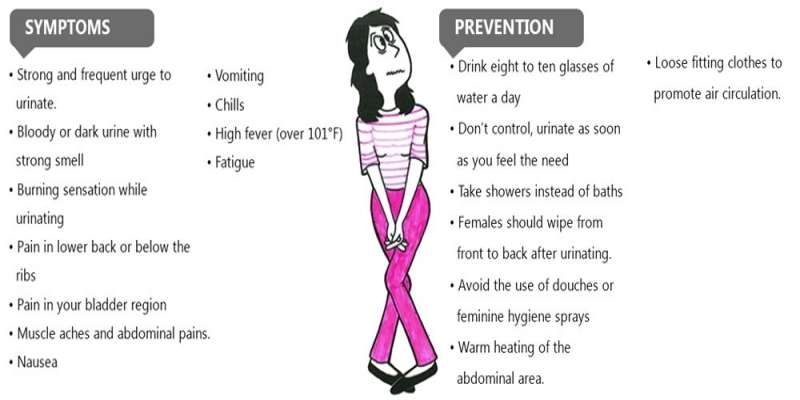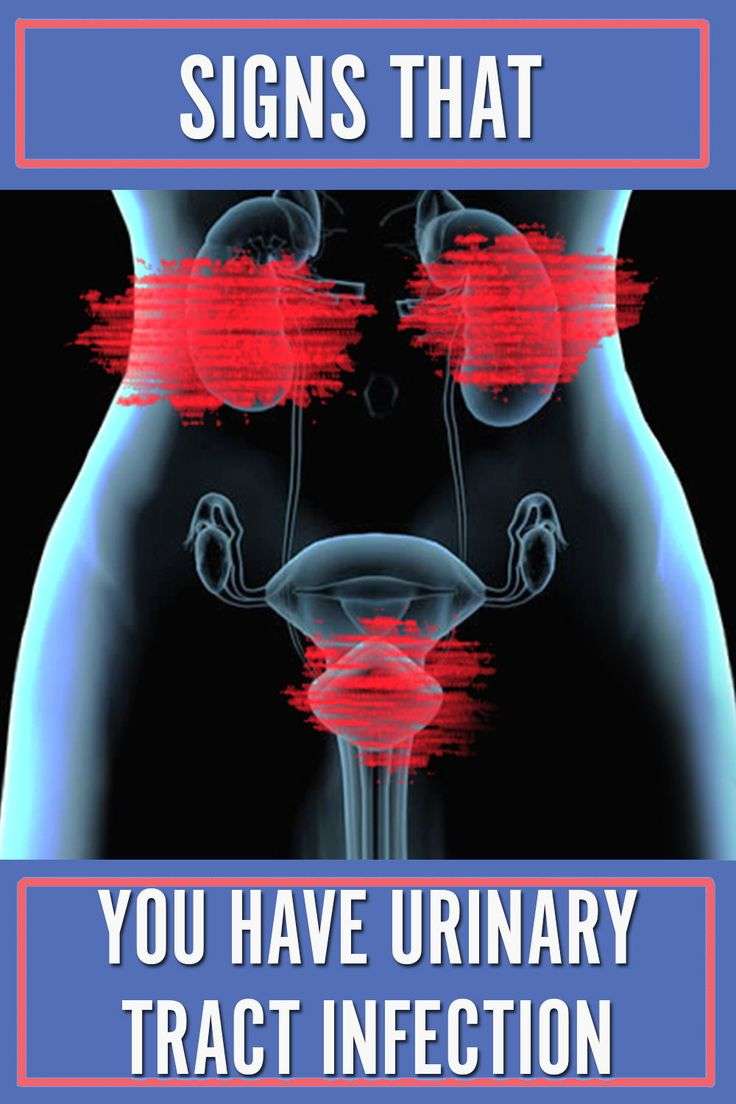Who Gets Urinary Tract Infections
Anyone can get a urinary tract infection, but they are more common in women. This is because the urethra in females is shorter and closer to the anus, where E. coli bacteria are common. Older adults also are at higher risk for developing cystitis. This increased risk may be due to incomplete emptying of the bladder. There are several medical conditions that can be related to this, including an enlarged prostate or a bladder prolapse .
If you get frequent urinary tract infections, your healthcare provider may do tests to check for other health problems such as diabetes or an abnormal urinary systemthat may be contributing to your infections. People with frequent UTIs are occasionally given low-dose antibiotics for a period of time to prevent the infection from coming back. This cautious approach to treating frequent UTIs is because your body can develop a resistance to the antibiotic and you can get other types of infections, such as C. diff colitis. This practice is used very infrequently.
How Can You Keep Your Urinary Tract Healthy
You can help keep your urinary tract healthy by following some basic tips.
Drink enough fluids, especially water. If youre healthy, try to drink six to eight 8-ounce glasses of fluid each day. You may need to drink more if you have kidney stones or bladder stones. At least half of your fluid intake should be water. You might need to drink less water if you have certain conditions, such as kidney failure or heart disease. Ask your health care professional how much fluid is healthy for you.
Keep your bowels regular. Regular bowel movements are important to your bladder health. You can promote both bowel health and bladder health by
- making healthy food choices. You can keep your urinary tract healthy by sticking to an eating plan that includes lean proteins, whole grains, fiber-rich breads, nuts, colorful berries, fruits, and vegetables to promote regular bowel movements.
- living a healthy lifestyle. Get regular physical activity, limit your alcohol intake, cut down on caffeinated food and drinks, and dont smoke.
Go whenever you need to. Often, people will hold their urine because its not a good time to go to the bathroom. However, holding in your urine for too long can weaken your bladder muscles and make it harder for your bladder to empty completely. Urine left in your bladder can allow bacteria to grow and makes you more likely to develop a urinary tract infection .
Complementary And Alternative Therapies
Some complementary and alternative therapies may be helpful for UTIs, but they may not be right for every person. Natural medicines and supplements may interact with prescription medications. Work with a knowledgeable health care provider, and always tell all of your providers about the herbs and supplements you are taking.
Don’t Miss: What Can I Do To Prevent Urinary Tract Infections
What Are The Symptoms Of A Uti
If you have a UTI, you may have some or all of these symptoms:6,7
- Pain or burning when urinating
- An urge to urinate often, but not much comes out when you go
- Pressure in your lower abdomen
- Urine that smells bad or looks milky or cloudy
- Blood in the urine. This is more common in younger women. If you see blood in your urine, tell a doctor or nurse right away.
- Feeling tired, shaky, confused, or weak. This is more common in older women.
- Having a fever, which may mean the infection has reached your kidneys
Can I Become Immune To The Antibiotics Used To Treat A Uti

Your body can actually get used to the antibiotics typically used to treat a urinary tract infection . This happens in people who have very frequent infections. With each UTI and use of antibiotics to treat it, the infection adapts and becomes harder to fight. This is called an antibiotic-resistant infection. Because of this, your healthcare provider may suggest alternative treatments if you have frequent UTIs. These could include:
- Waiting: Your provider may suggest that you watch your symptoms and wait. During this time, you may be encouraged to drink plenty of fluids in an effort to flush out your system.
- Intravenous treatment: In some very complicated cases, where the UTI is resistant to antibiotics or the infection has moved to your kidneys, you may need to be treated in the hospital. The medicine will be given to you directly in your vein . Once youre home, you will be prescribed antibiotics for a period of time to fully get rid of the infection.
Recommended Reading: E Coli In Urinary Tract
Lower Urinary Tract Symptoms
Many women find that they have problems with their urinary tract in association with the menopause due to estrogen deficiency.
Some suffer from stress incontinence leaking of urine on coughing, sneezing or jumping, whilst others experience urge incontinence presenting as difficulty holding on once there is recognition of a need to empty the bladder. They may also leak and start to pass urine before they can get to the toilet.
How To Feel Better
If your healthcare professional prescribes you antibiotics:
- Take antibiotics exactly as your healthcare professional tells you.
- Do not share your antibiotics with others.
- Do not save antibiotics for later. Talk to your healthcare professional about safely discarding leftover antibiotics.
Drink plenty of water or other fluids. Your healthcare professional might also recommend medicine to help lessen the pain or discomfort. Talk with your healthcare professional if you have any questions about your antibiotics.
Recommended Reading: What Cause Urinary Tract Infection In Male
Im A Doctor And These 4 Signs In Your Urine Could Be Symptoms Of Kidney Problems
- 9:04, 24 Jan 2022
KEEPING an eye on your pee could help identify a nasty health problem, doctors have warned.
Seeing things like blood in your urine should set the alarm bells ringing.
But there are four warning signs that should spark slight concern if you notice them in your pee.
It doesn’t mean there is definitely a problem, but could be something worth looking into.
Consultant urologist at the Queen Elizabeth Hospital in Birmingham, Dr Richard Viney has outlined what the four are, and what they might mean.
Who Is At Risk
Women at greater risk of contracting a UTI:
- are sexually active
- have diabetes
- have urinary incontinence.
Frequent UTIs in women need further assessment. High fever and pain in the back can indicate a kidney infection and this needs urgent medical treatment.
A partner is not at risk of catching a UTI if you have sex. However, the symptoms may be uncomfortable and you may not feel like having sex.
Also Check: Azithromycin Urinary Tract Infection Dose
What Else Causes Bladder Control Problems In Women
Certain life events and health problems can lead to stress incontinence in women by weakening the pelvic floor muscles
- pregnancy and childbirth
- menopause
Weak pelvic floor muscles can make it hard for your bladder to hold urine in during stress incontinence. Stress incontinence occurs when an actioncoughing, sneezing, laughing, or physical activityputs pressure on your bladder and causes urine to leak. A weak pelvic floor can also cause fecal incontinence, or bowel control problems.
Treatment From A Gp For Utis That Keep Coming Back
If your UTI comes back after treatment, you may have a urine test and be prescribed different antibiotics.
Your doctor or nurse will also offer advice on how to prevent UTIs.
If you keep getting UTIs and regularly need treatment, a GP may give you a repeat prescription for antibiotics.
If you have been through the menopause, you may be offered a vaginal cream containing oestrogen.
Don’t Miss: Treatment For Urinary Retention In Males
Frequent Urination In Women
What is frequent urination?
Frequent urination is the need to urinate more than you normally would. The urge can strike suddenly and can cause you to lose control of your bladder. It can feel uncomfortable, like your bladder is extremely full.
Frequent urination is also referred to as having an overactive bladder. Urologists, who are doctors that specialize in the urinary system, consider going more than 8 times in 24 hours to be frequent urination.
The key to treating frequent urination is addressing the underlying cause.
A urinary tract infection is a common cause of frequent urination. This happens when bacteria enter the bladder through the urethra.
Its estimated that 50 to 60 percent of women will experience at least one UTI in their lives. One-third of women will experience one before the age of 24 thats severe enough to require antibiotics.
Women are more at risk for a UTI than men because their urethras are shorter. Bacteria have less distance to travel before they can infect the urinary tract and cause symptoms.
Common risk factors for a UTI include:
What Causes Utis In Women

A UTI is caused by bacteria from your skin or rectum entering the urinary tract and causing an infection. Women with typically female genitals are more likely than other people to get UTIs. The urethra is the tube that takes urine out of your body from your bladder. In most women, the urethra is shorter and closer to the rectum. Both of these factors mean that bacteria dont have as far to travel, making it easier for an infection to start. Some women may have different types of genitals. Depending on their anatomy, these women may be more or less likely to get UTIs.
Don’t Miss: Neurological Causes Of Urinary Incontinence
Contact Doctor Within 24 Hours
- Blood in urine and new onset since starting antibiotic
- Taking antibiotic more than 24 hours, and pain with passing urine is severe.
- Taking antibiotic more than 48 hours and fever still there or comes back
- Taking antibiotic more than 3 days and pain not better
- You think your child needs to be seen, but the problem is not urgent
How Soon After Starting Kegel Exercises Will Urinary Incontinence Get Better
It may take 4 to 6 weeks before you notice any improvement in your symptoms.10
Kegel exercises work differently for each person. Your symptoms may go away totally, you may notice an improvement in your symptoms but still have some leakage, or you may not see any improvement at all. But even if your symptoms dont get better, Kegel exercises can help prevent your incontinence from getting worse.
You may need to continue doing Kegel exercises for the rest of your life. Even if your symptoms improve, urinary incontinence can come back if you stop doing the exercises.
Also Check: Where To Buy Azo Urinary Pain Relief
Diet Related Tips For Bladder Problems In Older Women
Drink lots of water
Hydration! Hydration! Hydration! Remain hydrated by drinking at least 6 -8 eight ounce glasses of water a day. If you are like me, with a preference for drinking other fluids, it is recommended that you try to make half of your fluid intake water because water is the best fluid for bladder health.
Limit your consumption of alcohol and caffeinated drinks or beverages. The key word is limit and not necessarily cut out.
Maintain a healthy high fiber diet fruits, vegetables and whole grains to prevent constipation. Straining for bowel movement can weaken your sphincter muscles and could also result in incontinence.
Avoid bladder irritants. Avoid or eliminate any foods that irritate your bladder. Some of these may include spicy and acidic foods, caffeine, alcohol and carbonated beverages
So What Are My Risk Factors
| Sexual activity can move bacteria from the bowel or vaginal cavity to the urethral opening. Urinating after sex lowers the risk of infection. |
| You had a UTI in the past |
| You have gone through menopause |
| You are obese |
| You have trouble emptying your bladder |
| You have an abnormality of the urinary tract – only your doctor can identify this for you |
| There is an obstruction in the urinary tract such as a kidney stone |
| You have diabetes or problems with your body’s immune system |
| You recently used a catheter- a tube placed in the urethra and bladder to help empty the bladder can be an entry point for bacteria into the bladder. |
Senior Woman
Don’t Miss: What Happens If You Have A Urinary Tract Infection
Whats The Difference Between A Urinary Tract Infection And Bladder Infection
A urinary tract infection is a more general type of infection. There are many parts of your urinary tract. A UTI is a term for an infection that takes place throughout the urinary tract. A bladder infection, also called cystitis, is a specific infection. In this infection, bacteria makes its way into the bladder and causes inflammation.
Not all urinary tract infections become bladder infections. Preventing the spread of the infection is one of the most important reasons to treat a UTI quickly when you have symptoms. The infection can spread not only to the bladder, but also into your kidneys, which is a more complicated type of infection than a UTI.
What Tests Are Commonly Performed
The tests you may have will depend on your symptoms.
Your doctor may want to examine your tummy . A vaginal examination may be suggested.
The most common tests performed include:
- A urine dipstick test for infection, sugar and blood.
- A urine test to send to the hospital to confirm the dipstick findings.
- A blood test for glucose to rule out diabetes.
You may have an ultrasound scan on your bladder and urinary tract. You may be referred to a specialist for tests on your urinary system . Urodynamic studies test the working of the bladder and are used to see how the urinary system and pelvic floor work. You may be asked to keep a diary. In your diary make a note of the times you pass urine and the amount that you pass each time. Also, make a note of the times you leak urine . Your doctor or nurse may have some pre-printed diary charts to give you for this purpose. Keep an old measuring jug by the toilet so that you can measure the amount of urine you produce each time you go to the toilet.
If you have unexplained blood in your urine, you will be referred urgently to a urologist for further tests.
Also Check: Can Smoking Weed Cause Urinary Problems
Treatment Considerations In Older Adults
Dr N: She told me that her incontinence had definitely gotten worse in the last couple of weeks. I had noticed that another physician had sent a urine culture that had grown more than 105 CFU/mL of E coli that was sensitive to all antibiotics. Assuming that this was asymptomatic bacteriuria, it was not treated with antibiotics. A repeat urine culture again showed more than 105 CFU/mL of E coli, again it was pan sensitive. Given her symptoms, I treated her with a 7-day course of an antibiotic. However the antibiotics didnt really make a difference.
Studies have shown that treatment of asymptomatic bacteriuria does eradicate bacteriuria. However, reinfection rates , adverse antimicrobial drug effects, and isolation of increasingly resistant organisms occur more commonly in the therapy vs nontherapy groups. No differences in genitourinary morbidity or mortality were observed between the 2 groups.
What Other Treatments Are Available

The treatment for LUTS will depend on the underlying cause. Often, no specific cause is found and so there is no specific treatment. Some women find that their symptoms come and go and do not cause them a great deal of bother or distress. But if your LUTS do interfere with your normal life, you should see your doctor for advice.
You may be offered help at a special continence clinic which can advise about pelvic floor exercises and ways of coping with incontinence. Specialist incontinence nurses can also advise about pads and catheters.
Medicines can be effective in helping symptoms of an overactive bladder if there is not enough improvement with bladder training alone. These medicines work by blocking certain nerve impulses to the bladder which relax the bladder muscle, so increasing the bladder capacity. These medications are called antimuscarinics . There are several different types and many different brand names. They include oxybutynin, solifenacin and tolterodine.
HRT can help menopausal symptoms including vaginal dryness and discomfort when you urinate.
You may be referred to a specialist if your symptoms do not improve after self-help measures and treatment from your doctor.
Read Also: What Causes Urinary Urgency And Frequency
How Are Urinary Tract Infections Diagnosed
Your doctor will use the following tests to diagnose a urinary tract infection:
- Urinalysis: This test will examine the urine for red blood cells, white blood cells and bacteria. The number of white and red blood cells found in your urine can actually indicate an infection.
- Urine culture: A urine culture is used to determine the type of bacteria in your urine. This is an important test because it helps determine the appropriate treatment.
If your infection does not respond to treatment or if you keep getting infections over and over again, your doctor may use the following tests to examine your urinary tract for disease or injury:
- Ultrasound: In this test, sound waves create an image of the internal organs. This test is done on top of your skin, is painless and doesnt typically need any preparation.
- Cystoscopy: This test uses a special instrument fitted with a lens and a light source to see inside the bladder from the urethra.
- CT scan: Another imaging test, a CT scan is a type of X-ray that takes cross sections of the body . This test is much more precise than typical X-rays.